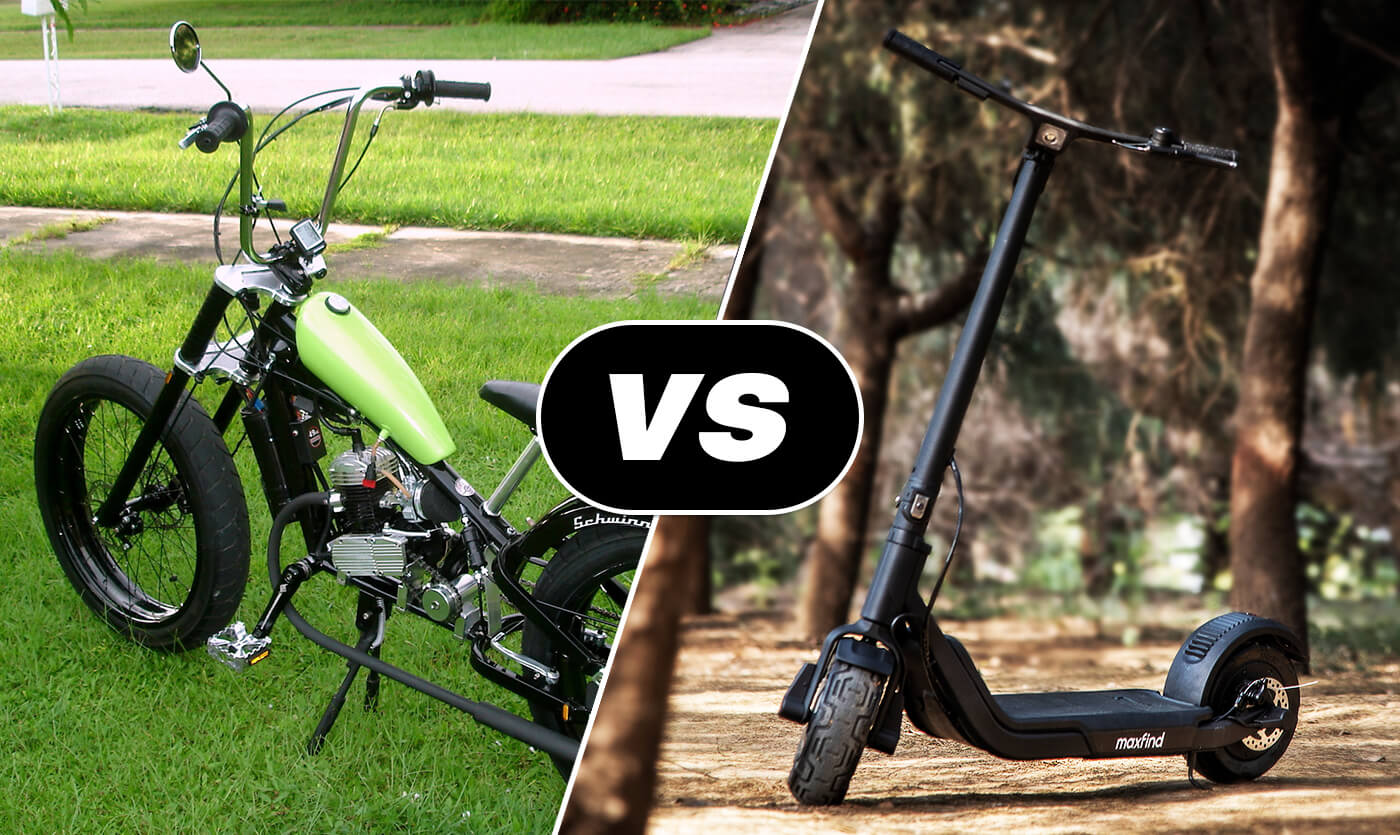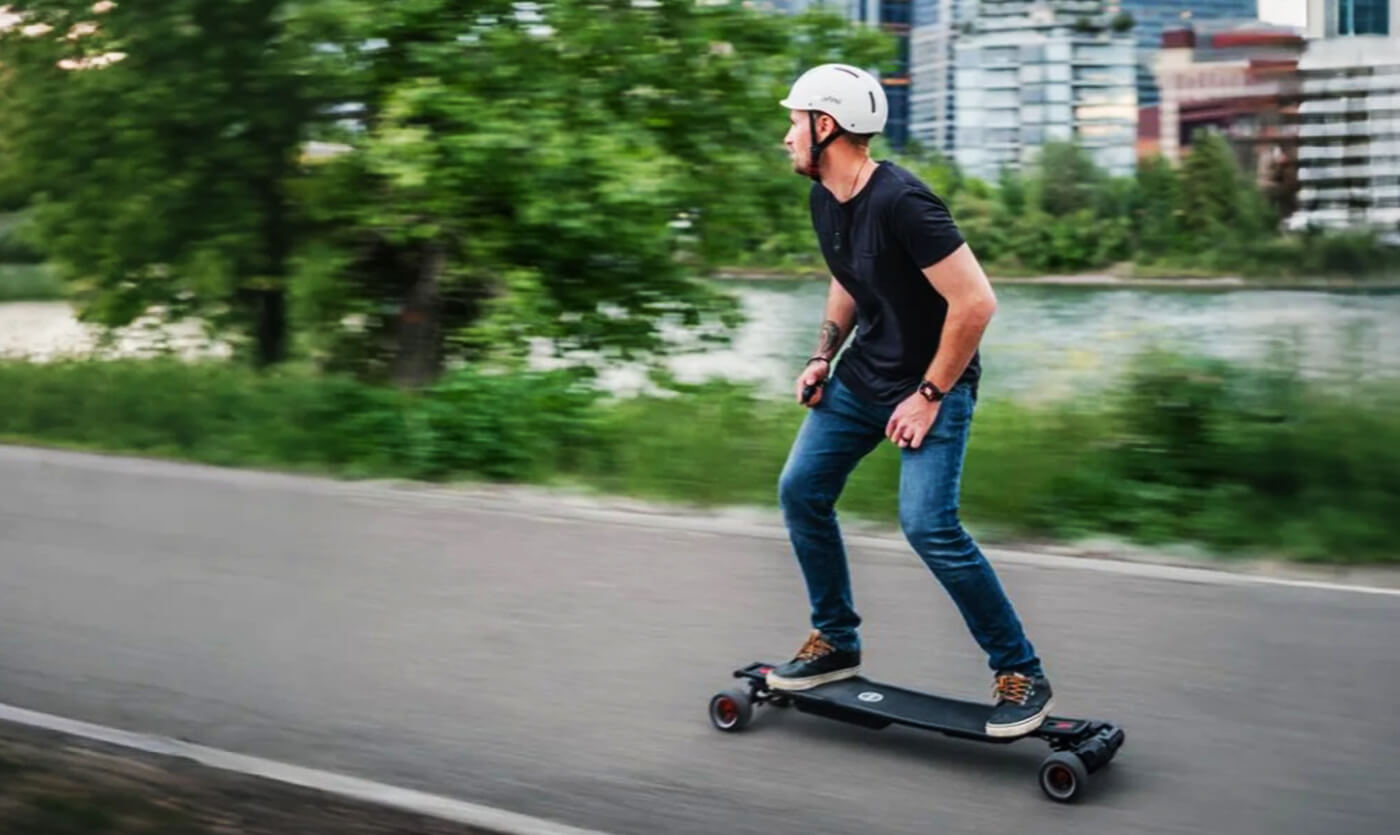Motorized scooters typically offer longer ranges and higher speeds, making them great for longer trips. On the other hand, electric scooters are portable, eco-friendly, and low-maintenance, making them ideal for short commutes or navigating through busy urban streets.
In this guide, we’ll break down the key differences between motorized and electric scooters to help you decide which one best fits your needs.

Understanding the Key Differences Between Motorized and Electric Scooters
When considering a scooter for your daily commute or weekend ride, it’s crucial to understand the fundamental differences between motorized and electric scooters. Here’s what you need to know:
What Makes Motorized Scooters Different?
Motorized scooters are typically powered by gasoline or other fuels, offering a traditional engine-powered experience. They are often faster and have longer ranges compared to electric scooters. However, motorized scooters require more maintenance, including fuel refills and engine servicing.
Key Points:
-
Speed: Faster acceleration and top speeds.
-
Range: Longer range between refuels.
-
Maintenance: More complex maintenance due to the engine and fuel system.
Noise and Emissions: Gasoline-powered engines generate noise and emissions.

Electric Scooters: The Modern, Eco-Friendly Alternative
Electric scooters, on the other hand, run on rechargeable batteries. They are quiet, eco-friendly, and typically require less maintenance, making them an appealing choice for many urban dwellers and eco-conscious individuals.
Key Points:
-
Speed: Generally slower than motorized scooters.
-
Range: Limited range, but sufficient for short commutes.
-
Maintenance: Minimal maintenance, mainly focused on battery care.
Noise and Emissions: Quiet operation and zero emissions.
Performance Comparison: Speed, Range, and Power
Before making a decision, it's important to understand how both types of scooters perform in real-world conditions. This will help you determine which option suits your specific needs.
Speed and Acceleration: Which One is Faster?
Motorized scooters usually take the lead when it comes to speed and acceleration. Gas-powered engines allow for faster travel, especially on open roads or highways. Electric scooters, while improving in speed with technological advancements, still generally fall short compared to their motorized counterparts.
Tip: If you’re looking for speed, motorized scooters are ideal. However, if you're more interested in a balanced, eco-friendly ride, an electric scooter will suffice for everyday commuting.
Range: How Far Can You Go?
Motorized scooters typically have a longer range than electric scooters because they are powered by fuel. On a full tank, a motorized scooter can often travel 50 miles or more, depending on the model. Electric scooters, however, have a more limited range, averaging anywhere between 10 to 30 miles per charge.
Tip: For daily city commuting, an electric scooter is usually enough. But for longer trips or weekend rides, a motorized scooter might be a better option.
Power and Terrain: Which Handles Different Conditions Better?
Motorized scooters tend to have a stronger engine, making them better suited for hilly terrain or rough roads. Electric scooters, while generally sufficient for flat urban environments, may struggle on steep inclines or rough surfaces.
Tip: If your daily route includes hills or uneven surfaces, a motorized scooter might be a better choice. Electric scooters perform best on smooth, paved roads.

Cost and Affordability: What’s the Total Cost of Ownership?
When choosing between motorized and electric scooters, it’s important to consider both the upfront cost and long-term affordability.
Upfront Costs: What’s the Price Difference?
Electric scooters tend to be more affordable upfront, with many models starting at $300-$500. Motorized scooters, on the other hand, often have higher price points, typically ranging from $700 to $1,500 or more.
Tip: If budget is a major concern, an electric scooter provides a more affordable entry point. However, consider the long-term costs, including maintenance and energy usage.
Long-Term Costs: Charging vs. Refueling
Electric scooters have the advantage of lower operational costs. Charging an electric scooter typically costs only a few cents per charge. Motorized scooters, however, require gasoline, and fuel prices can vary significantly depending on your location.
Tip: Electric scooters are cheaper to run in the long term, especially if you plan to use them daily. However, if you need to refuel frequently, motorized scooters can become more expensive.
Maintenance Costs: Which Scooter is Easier to Maintain?
Electric scooters are known for their simplicity and low maintenance needs. You primarily need to worry about battery care and occasional tire or brake replacements. In contrast, motorized scooters require regular engine servicing, oil changes, and fuel system maintenance, which can add up over time.
Tip: If you’re looking for something low-maintenance, electric scooters are the better choice. Motorized scooters, while durable, require more attention and money over time.
Environmental Impact: Which Scooter is Greener?
Eco-conscious users often prefer electric scooters because of their minimal environmental impact. Motorized scooters, with their gasoline engines, emit carbon and contribute to pollution.
Emissions and Sustainability
Electric scooters have a significant edge in this area, as they don’t emit any carbon dioxide or other pollutants. Motorized scooters, however, contribute to air pollution and have a larger carbon footprint due to their fuel consumption.
Tip: If reducing your carbon footprint is a priority, electric scooters are the clear winner. They are a cleaner, more sustainable option.
Portability and Storage: Which One Fits Your Lifestyle?
Scooters are meant to be convenient, but portability and storage can be an issue for both types. If you're someone who likes to venture off the beaten path, you might also consider exploring other transportation options like all terrain electric skateboards. These boards are designed to handle a variety of terrains, from smooth city streets to rough, uneven paths, offering more versatility for outdoor enthusiasts.
If you’re interested in a board that can go anywhere, check out the Maxfind FF AT All Terrain Electric Skateboard. With powerful motors and a robust design, it’s perfect for those who want a combination of speed, power, and the ability to conquer all types of terrain with ease.
Weight and Foldability
Electric scooters generally have an advantage in portability. Many models are lightweight and foldable, making them easy to carry or store in tight spaces. Motorized scooters, due to their larger engines and fuel systems, are typically bulkier and harder to store.
Tip: If portability is a top concern, go for an electric scooter. You’ll find options that fold up easily for storage in apartments or public transport.
Storage Needs
Electric scooters often require less storage space and are ideal for people with limited room at home or work. Motorized scooters, while durable, require more space for proper storage.
Tip: If you're tight on space, an electric scooter is usually the more practical option.
Related Reading: Fastest Electric Scooter Under $1000
Legal and Regulatory Considerations
Before you buy a scooter, it’s crucial to check the laws in your area to ensure compliance. Different regions have varying rules for motorized and electric scooters.
Speed Limits and Where You Can Ride
Electric scooters are often restricted to certain speed limits (usually around 15-20 mph) and specific areas (e.g., bike lanes, certain streets). Motorized scooters, due to their higher speeds, may have stricter regulations regarding where they can be ridden.
Tip: Be sure to check local laws to see where each type of scooter is allowed and the speed limits enforced in your area.
Helmet and Licensing Requirements
Many regions require helmets for both motorized and electric scooters, and some places may require a license to operate motorized scooters, especially those with higher top speeds.
Tip: Always check local helmet laws and whether you need to register your scooter.
Quick Comparison: Motorized vs Electric Scooters
|
Feature |
Motorized Scooters |
Electric Scooters |
|
Speed |
Faster acceleration and higher top speeds |
Slower acceleration, lower top speeds |
|
Range |
50+ miles per tank |
10-30 miles per charge |
|
Maintenance |
Requires more maintenance (oil changes, engine servicing) |
Low maintenance (battery care, tire checks) |
|
Fueling/Charging |
Requires refueling with gas |
Charges with electricity, cheaper operational costs |
|
Environmental Impact |
Produces emissions, contributes to pollution |
Zero emissions, eco-friendly |
|
Portability |
Heavier, less portable |
Lightweight, foldable options available |
|
Cost |
Higher upfront cost, more expensive in the long run |
Lower upfront cost, cheaper long-term costs |
|
Terrain Handling |
Better for hills and rough terrain |
Best for flat, paved roads |
Conclusion: Which Scooter is Right for You?
Choosing between motorized and electric scooters depends on several factors: your budget, commute length, environmental concerns, and maintenance willingness. Electric scooters are often the better choice for budget-conscious and eco-friendly consumers, while motorized scooters provide higher speeds and longer ranges for those willing to invest more upfront.
Final Tip: Evaluate your primary needs—whether that’s speed, range, ease of maintenance, or environmental impact—and choose a scooter that fits your lifestyle and budget.






Share:
How Fast Can an Electric Skateboard Go? Riding Maximum Speed?
How Much is an Electric Skateboard? A Complete Pricing Guide